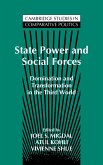The Solidarity movement of the early 1980s not only triggered a transformation in Polish society. It forced a fundamental reconsideration of the nature of socialism throughout the Soviet Union and Eastern Europe. Solidarity will be seen as one of the most important social movements of the century. Michael Kennedy develops a theoretical conception of Soviet-type societies by analyzing Solidarity's significance on three levels. First, he explains the background to the nature of the conflict between Solidarity and the authorities by examining the relation between the distribution of power and movement strategies. Second, he considers the implications of Solidarity's struggle for the theory of the Soviet-type system's reproduction and transformation by offering a critique and synthesis of relevant theories of class and civil society. Third, he examines the internal constitution of Solidarity in terms of gender and, in particular, cross-class alliances. He argues that because engineers and physicians were dependent on the self-organized working class in this conflict between civil society and state, professional projects had to be recast in visions suitable to the alliance. In a concluding chapter, he explores the implications of his analysis both for understanding perestroika in the Soviet Union and more generally for reformulating a critical sociology of Soviet-type societies. Professionals, Power and Solidarity in Poland is the most informed and the best-documented study of Solidarity to date. As Soviet-type societies are in translation, there is a pressing need for theoretical reconceptualization. Kennedy's pathbreaking study will become essential reading for specialists and students of Soviet and East European Studies, and of modern Poland in particular; specialists in political sociology and the sociology of social movements and for activists in radical politics.
Table of contents:
List of tables; Acknowledgments; List of abbreviations; Introduction; Part I. Solidarity and Social Transformation: 1. The historical genealogy of solidarity; 2. The nature and causes of solidarity; 3. The solidarity movement as emancipatory praxis; Part II. Solidarity and the Theory of Soviet-type Society: 4. Solidarity, modernization and class; 5. Solidarity, culture and civil society; 6. A theory of power relations in Soviet-type society; Part III. Professionals and Solidarity: 7. Professionals, power and prestige; 8. Engineers in solidarity; 9. Physicians in solidarity; Part IV. Conclusion: 10. Critical sociology and Soviet-type society; Notes; References; Index.
Table of contents:
List of tables; Acknowledgments; List of abbreviations; Introduction; Part I. Solidarity and Social Transformation: 1. The historical genealogy of solidarity; 2. The nature and causes of solidarity; 3. The solidarity movement as emancipatory praxis; Part II. Solidarity and the Theory of Soviet-type Society: 4. Solidarity, modernization and class; 5. Solidarity, culture and civil society; 6. A theory of power relations in Soviet-type society; Part III. Professionals and Solidarity: 7. Professionals, power and prestige; 8. Engineers in solidarity; 9. Physicians in solidarity; Part IV. Conclusion: 10. Critical sociology and Soviet-type society; Notes; References; Index.









